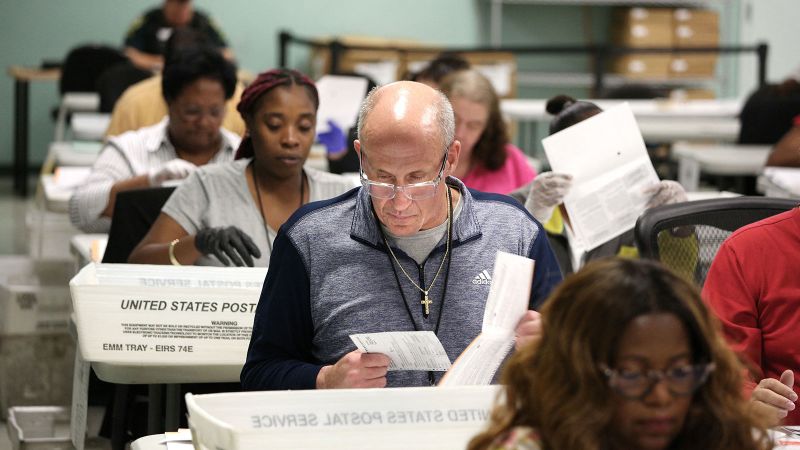F.B.I. Is Pursuing ‘Hundreds’ in Capitol Riot Inquiry, Wray Tells Congress
In two separate hearings, the F.B.I. director and Pentagon officials answered questions about the failure to adequately prepare for and respond to the Jan. 6 attack.

In two separate hearings, the F.B.I. director and Pentagon officials answered questions about the failure to adequately prepare for and respond to the Jan. 6 attack.

June 15, 2021
WASHINGTON — The F.B.I. is pursuing potentially hundreds more suspects in the Capitol riot, the agency’s director told Congress on Tuesday, calling the effort to find those responsible for the deadly assault “one of the most far-reaching and extensive” investigations in the bureau’s history.
“We’ve already arrested close to 500, and we have hundreds of investigations that are still ongoing beyond those 500,” Christopher A. Wray, the F.B.I. director, told the House Oversight Committee.
His assurances of how seriously the agency was taking the attack by a pro-Trump mob came as lawmakers pressed him and military commanders on why they did not do more to prevent the siege despite threats from extremists to commit violence.
“The threats, I would say, were everywhere,” said Representative Carolyn B. Maloney, a New York Democrat who is the chairwoman of the Oversight Committee. “The system was blinking red.”
Ms. Maloney confronted Mr. Wray with messages from the social media site Parler, which she said referred threats of violence to the F.B.I. more than 50 times before the attack on Jan. 6. One message, which Ms. Maloney said Parler had sent to an F.B.I. liaison on Jan. 2, was from a poster who warned, “Don’t be surprised if we take the Capitol building,” and “Trump needs us to cause chaos to enact the Insurrection Act.”
“I do not recall hearing about this particular email,” Mr. Wray replied. “I’m not aware of Parler ever trying to contact my office.”
In hearings before two congressional committees on Tuesday, lawmakers sought new information about the security failures that helped lead to the violence.
At one hearing, Ms. Maloney presented her committee’s research into the delayed response of the National Guard, which showed that the Capitol Police and Washington officials made 12 “urgent requests” for their support and that Army leaders told the National Guard to “stand by” five times as the violence escalated.
“That response took far too long,” Ms. Maloney said. “This is a shocking failure.”
Documents obtained by the committee showed that, beginning at 1:30 p.m. on Jan. 6, top officials at the Defense Department received pleas for help from the Capitol Police chief, Mayor Muriel Bowser of Washington and other officials. But the National Guard did not arrive until 5:20 p.m., more than four hours after the Capitol perimeter had been breached.
“The National Guard was literally waiting, all ready to go, and they didn’t receive the green light for a critical time period, hours on end,” said Representative Ro Khanna, Democrat of California and a member of the committee.
Lawmakers had tough questions for Gen. Charles Flynn, who commands the U.S. Army Pacific, and Lt. Gen. Walter E. Piatt, the director of the Army staff, both of whom were involved in a key phone call with police leaders during the riot in which Army officials worried aloud about the “optics” of sending in the Guard, according to those involved. It was the first time lawmakers had heard from either general.
In their testimony, they described the frantic call in which the chiefs of the Capitol Police and the Metropolitan Police became agitated as they tried unsuccessfully to get military support while rioters attacked their officers at the Capitol.
Image
“Both speakers on the phone sounded highly agitated and even panicked,” General Flynn recalled.
By contrast, he said, General Piatt was a “calm” and “combat-experienced leader.”
General Piatt has defended his caution in initially advising against sending in the National Guard, telling the committee that he was “definitely concerned” in the days before Jan. 6 “about the public perception of using soldiers to secure the election process in any manner that could be viewed as political.”
He told the committee that National Guard forces were “not trained, prepared or equipped to conduct this type of law enforcement operation.”
“When people’s lives are on the line, two minutes is too long,” General Piatt said. “But we were not positioned for that urgent request. We had to re-prepare so we would send them in prepared for this new mission.”
General Flynn is the brother of Michael T. Flynn, President Donald J. Trump’s disgraced former national security adviser who has emerged as one of the former president’s biggest promoters of the lie of a stolen election.
In submitted testimony, General Flynn said he had not participated in the call but merely overheard portions of it when he entered the room while it was in progress. He said that he had not heard any discussion of political considerations with regard to sending in the Guard.
“I did not use the word ‘optics,’ nor did I hear the word used during the call on Jan. 6, 2021,” he said.
Image
The panel did not hear testimony from the acting chief of the Capitol Police, Yogananda D. Pittman, who declined to attend, citing her need to hear testimony at the other hearing, before the House Administration Committee. Republicans were quick to criticize her decision and repeatedly referred to her absence during the session, which stretched into the evening.
Ms. Maloney said she was also “disappointed,” but she added that Chief Pittman had committed to testifying on July 21.
In a simultaneous session on Tuesday afternoon, the House Administration Committee heard testimony from Michael A. Bolton, the Capitol Police inspector general, and Gretta L. Goodwin, the director of homeland security and justice for the Government Accountability Office.
Mr. Bolton testified about his fourth investigative report into the failures of Jan. 6, which found that the department’s tactical unit did not have access to “adequate training facilities” or adequate policies in place for securing ballistic helmets and vests (two dozen were stolen during the riot); the agency’s first responder unit was also not equipped with adequate less-lethal weapons, among other findings.
Mr. Bolton’s reports found that the Capitol Police had clearer warnings about the riot than were previously known, including the potential for violence in which “Congress itself is the target.” He also revealed that officers were instructed by their leaders not to use their most aggressive tactics to hold off the mob, in part because they feared that they lacked the training to handle the equipment needed to do so.
About 140 officers were injured during the attack, and seven people died in connection with the siege, including one officer who had multiple strokes after sparring with rioters.
“It is our duty to honor those officers who have given their lives but also ensuring the safety of all those working and visiting the Capitol complex by making hard changes within the department,” Mr. Bolton said.
Ms. Goodwin said that some of the command-and-control issues had been flagged by her agency in 2017. But the Capitol Police Board, which oversees the operations of the force, had not acted on the Government Accountability Office’s recommendations or responded to its requests for progress reports.
“As of today, the board has not provided us with any substantive information consistent with the practices noted above,” she said.
At previous hearings on the attack, some House Republicans used the opportunity to try to rewrite the history of what happened on Jan. 6, downplaying or outright denying the violence and deflecting efforts to investigate it.
On Tuesday, some Republicans on the Oversight Committee tried to redirect the inquiry into other topics, calling for investigations of Black Lives Matter protesters or the Biden family.
“I would love to ask about the Durham report, Hunter Biden’s laptop, Hunter’s business dealings in China and a host of other things,” said Representative Jody B. Hice, Republican of Georgia.
The hearings came as Senator Chuck Schumer of New York, the majority leader, highlighted on the Senate floor an assessment from the F.B.I. and the Department of Homeland Security that concluded that adherents to the pro-Trump conspiracy theory QAnon were likely to try to carry out violence, “including harming perceived members of the ‘cabal’ such as Democrats and other political opposition.”
Speaker Nancy Pelosi of California said on Tuesday that she was considering moving forward with a select committee to further investigate the Capitol riot.
Ms. Pelosi said her preference was for the Senate to approve a bipartisan commission, but that no longer seemed possible after Senate Republicans blocked it.
“We can’t wait any longer,” she said.
Emily Cochrane and Glenn Thrush contributed reporting.
What's Your Reaction?




















